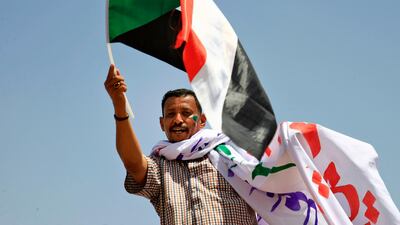Qatar has lost its influence in Sudan after abandoning Omar Al Bashir to his fate earlier this year and must now look to a potentially risky strategy of backing a civilian candidate in the post-transition elections to restore its sway.
The Sudanese president, who was ousted by the military on April 11, visited Doha in late January in hopes of getting financial support to ease economic conditions that had triggered more than a month of protests. He received only an offer of political asylum, according to sources.
This was shock to Mr Al Bashir after years political and financial backing from Doha. Qatari support helped him achieve a breakthrough in Sudan's restive western region with the 2011 Doha Document for Peace in Darfur. When protests broke out in 2013 over the removal of fuel subsidies, Qatar deposited US$1 billion (Dh3.67bn) in Sudan's central bank after Mr Al Bashir held talks in Doha with the then emir Sheikh Hamad bin Khalifa.
Sudan remained neutral when Saudi Arabia, the UAE, Bahrain and Egypt imposed a boycott of Qatar in June 2017, which Riyadh did not appreciate. Despite its close ties to Qatar, Mr Al Bashir's regime opted for neutrality because Saudi investments in Sudan has increased from $11bn in 2015 to $15bn in 2016 as a result of Sudanese participation in the Saudi-led Arab military coalition supporting the government in Yemen.
But Qatar's support for Mr Al Bashir was altered by the recognition that, compared to earlier revolts between 2011 and 2017, the protests that began in December were better co-ordinated and any intervention was doomed to failure.
Without backing from Qatar or Saudi Arabia, who Mr Al Bashir had played against each other to maintain his presidency, his days in power were numbered.
The Transitional Military Council that replaced the president also saw a swift change in the leadership as a result of divisions within the Sudanese Armed Forces.
Lt Gen Ahmed Ibn Auf, former vice president and defence minister under Mr Al Bashir, stepped down as chairman and transferred power to Lt Gen Abdel Fattah Al Burhan, another council member, on April 13. The new chairman immediately appointed Mohammed Hamdan Dagalo, also a member of the TMC and the head of the powerful Rapid Support Forces (RSF) paramilitary, as his deputy.
Both of the new leaders have been involved in supporting the Saudi-led coalition in Yemen. Lt Gen Al Burhan co-ordinated Sudan's participation during his earlier role as chief of the SAF land forces, which allowed him to develop good relationships with many Gulf officials, while Gen Dagalo's RSF is also part of the coalition forces.
A day after they were installed, Saudi Arabia pledged to assist Sudan with humanitarian aid, petroleum products, wheat and medicine to Sudan. Saudi Arabia and the UAE pledged a combined $3bn in aid to Sudan late last month.
Along with influence, Qatar also risks losing its investment in developing Sudan's Suakin Island, a strategic Red Sea port, under a $4bn deal signed in March last year.
One way for Qatar to now regain its hold on Sudan would be through support for leading contenders in the post-transition elections.
Prominent among these are Sadiq Al Mahdi, head of the Umma party and prime minister until Mr Al Bashir’s military coup in June 1989, and Ghazi Atabani, head of the Reform Now Party and a member of the National Front for Change that is taking part in negotiations for the transfer of power to civilian-led transitional government.
Mr Al Mahdi was late in supporting the uprising, but his decision to do so gave the movement a definite push, which he will likely capitalise on for the election.
Although Qatar has hosted him a few times, Mr Al Mahdi is more aligned with Egypt, Saudi Arabia and the UAE. He also has record of shifting domestic and external alliances, which makes Qatari support of his candidacy unlikely.
Like Mr Al Bashir, Mr Atabani is a member of Sudan's Islamic Movement, the founding organisation of the former president's National Congress Party. He was expelled from the NCP after calling for reforms following the protests in 2013.
Qatar might consider backing Mr Atabani for two reasons. First, his past membership of the NCP would make it easy for Doha to support his candidacy through its networks within the party and other Islamist groups in Sudan. Second, Mr Atabani's outspokenness and sincerity about political reform during his time in the regime have given him a credibility that will greatly help his election chances.
The Sudanese Professionals Association, the group that co-ordinated the uprising, might transform into a political party and contest the election. Its leadership of the protests has given it credibility among the people, and its calls for changes during the transition period suggests it plans to continue representing them.
Should Qatar decide to forgo its networks in Sudan and to re-establish its image in the Middle East, it will most likely support an SPA candidate.
However, given the influence of Saudi Arabia, the UAE and Egypt in the TMC, any Qatari attempt to support civilian candidates risks prompting an intervention by the council to keep a post-transition Sudan out of Doha's orbit.
Ultimately, although geopolitics will play some part in Sudan's future, it has been widely acknowledged by regional powers that the final outcome of the current upheaval rests in the hands of its people.
Dr Hesham Alghannam is a Saudi political scientist and a senior research fellow at the King Faisal Center for Research and Islamic Studies. Jihad Mashamoun is an independent Sudanese researcher whose focus is on international politics and security in Africa and the Middle East.

